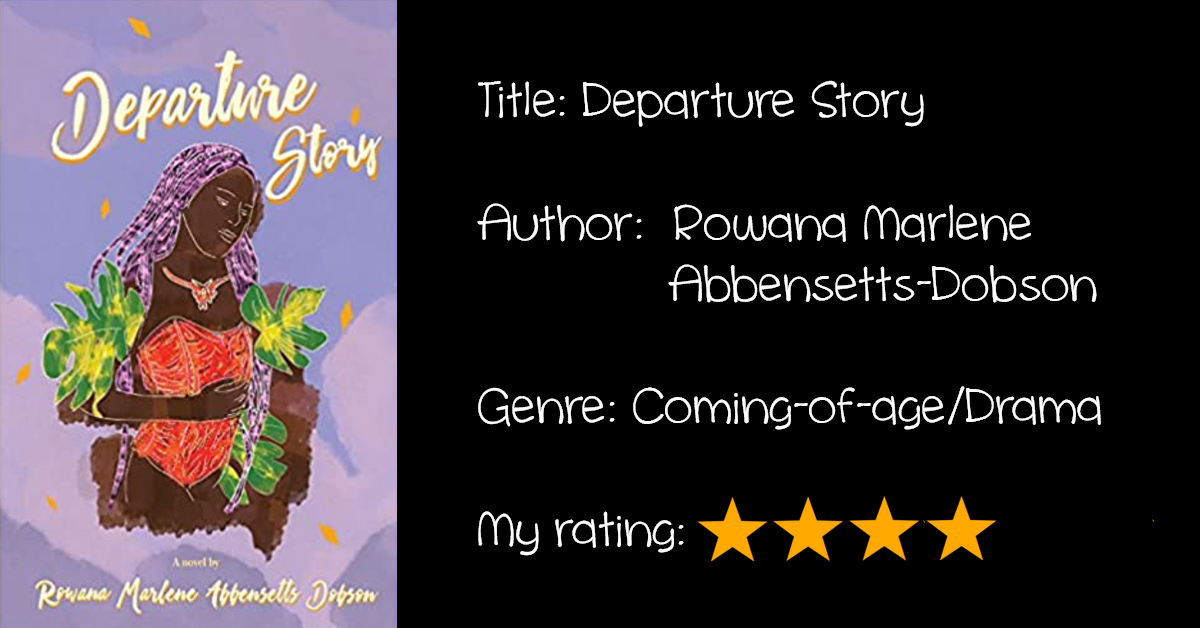Review: “Departure Story”
A touching coming-of-age story about the Caribbean experience colliding with the American dream
This was my thirty-first book I chose via the Reedsy Discovery program, for which I am the single approved reviewer for this new book. This review also appears on Reedsy.
If you’re interested in becoming a Reedsy reviewer (and have the chance to get paid “tips” to review books!) check it out here.
The Premise
Celestine has the opportunity of a lifetime — a scholarship to study in the U.S.A.: the land of the free, home of the brave, and the destination of the common “Caribbean dream” to migrate and create a life in a first world country. At her university, she becomes involved in romance and politics — both of which affect her deeply as she strives to fit in and create lasting friendships with both Americans and others like herself from other countries.
The Pros & Cons
This was a touching coming-of-age story about the Caribbean experience colliding with the American dream.
The tense relationship with Celestine’s mother and the love/hate tug-of-war with her sister are aptly captured. Though the Caribbean is known for the warmth and friendliness of its people, behind closed doors the typical Caribbean home often functions with these types of relationships that lack communication and expressions of love. In Celestine’s case, though she knows her mother loves her, it comes across as dislike:
My mother radiates despair. She has no control over it, I know, and so I forgive her again and again […] She gives her love like feeding babies from bleeding, cracked breasts. […] When she was loving us, it was yelling matches.
Celestine struggles to fit in with her American peers, but whenever she becomes comfortable and indulges herself in her new environment, she is put in her place by a pop culture reference or unknown dish that reminds her she is alone.
She even feels self-conscious when her new peers overhear her slipping into her “gibberish” local dialogue on the phone when talking to someone from home; for her, “code-switching” is crucial to survival as there is an additional pressure to represent herself as a Black, Caribbean woman:
I wondered who I was, wondered if I had been abducted and placed here as a ruse. […] I was wired all the time, in the process of being Celestine and making sure that Celestine was being properly consumed by others.
The throes of first love — with a white American boy, no less! — and the inevitable confusion and heartache when it fizzles out also influence her experience. As her friend Lucy explains, though Richard is a nice guy and might have true feelings for her, to him Celestine was still a “thing” — a thrilling, exotic object to serve his liberal progressive purpose, rather than a multi-dimensional person.
As she becomes involved in campus politics and strives for diversity, Celestine encounters adversity from both whites and Blacks — but she “forgets” at times to be soft and accommodating to temper her words. She realises that the “kinship of melanin” only goes so far — even to Black Americans, she is still seen as “other”. Nevertheless, she is eventually able to make small steps towards significant change.
Though I loved and appreciated this story, there were a few drawbacks. There was a chapter from her father’s perspective that seemed disconnected from the rest of the story, and there was some jumping around of perspectives where “Celestine” suddenly appears repeatedly in third person. I also felt at times that there were so many characters and sub-plots to keep track of (mainly her friends’ relationship dramas); I could easily have seen a few of these being cut out or reduced, as it didn’t need *quite* so much additional fluff to distract me from the beauty of the main story. Celestine was amazing on her own!
Conclusion
As a fellow Caribbean woman with Guyanese ancestry, and as someone who also studied abroad, this novel resonated with me personally — and I know it will be the same with others like myself. The author’s voice is powerful and unique in the way it unravels Celestine’s tale, and I loved the way she eloquently and expertly touches on some aspects of the Caribbean experience as a “fish out of water” in a first world country, always questioning if you belong there and if it will ever really feel like home, and also feeling that pressure from back home to “make it”. I am grateful that the author shared this story — much needed in the cacophony of homogeneous whiteness; we truly need to hear more Caribbean voices! I would recommend this novel to others, and I look forward to reading more by the author.








